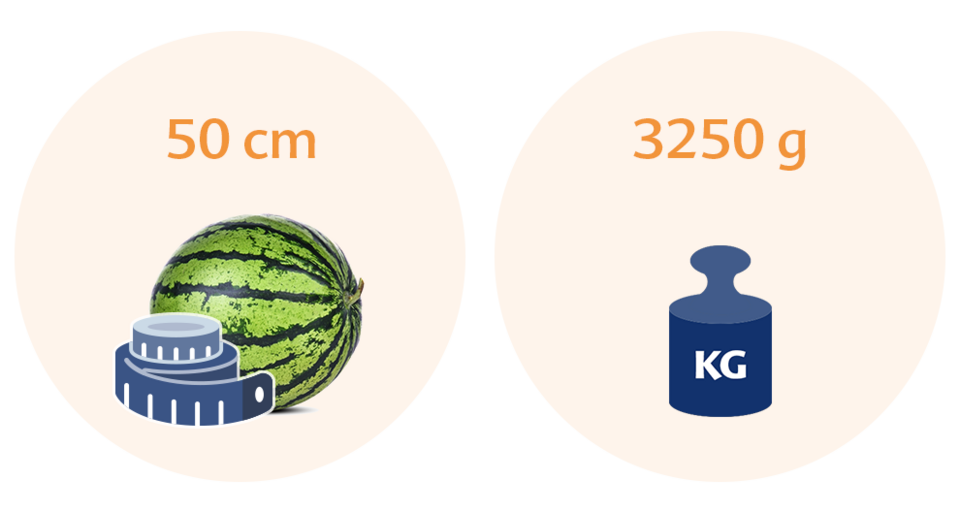Your baby is now about 50 cm long, about as big as a watermelon, and weighs roughly 3250 grams. On average, newborn babies weigh between 3200 and 3500 grams and are 50-52 cm long – whether your baby is longer/shorter or heaver/lighter than that depends chiefly on their genetic make-up and when they’re born.
Pregnancy weeks:
Week 39 of pregnancy: It could happen any time now

Size of your baby in week 39
Your baby’s development
What it’s like for the mum-to-be in week 39
Top tips
Questions you may want to ask your doctor or midwife
In week 39, it’s all about stopping, resting and waiting – most babies are born in this week of pregnancy. You’re now in the third week of the tenth month of your pregnancy, which will be over very soon.
Size of your baby in week 39

Your baby’s development
With all the weight your baby has put on as fat reserves for the time after the birth, they’ll look quite chubby. They’ll be curled up in a ball in the foetal position, ready to venture out into the world.
Babies who stay in the womb for longer will continue to put on weight and grow a little longer, although not as much as in recent weeks.
Their internal organs are fully developed, and each individual organ and system is at the stage where your baby can be supplied with everything they need to survive after they’re born. This includes all metabolic processes, which break down the food they eat so that their body can use it.
The big question of what your baby looks like can’t be answered until they’re born, but one thing all newborns have in common is that they look a lot like their dad. This resemblance is a natural process that will help your partner form an emotional bond with their child and encourage them to look after your little one as much as possible. It will be a few weeks and months until your baby develops their personal appearance, which will combine aspects of both their parents’ looks. So during this early time in their life, your child will sometimes look more like their mum and sometimes more like their dad.
Your baby’s eyes won’t have their final colour until they’re 12-18 months old. This is because the pigments are still forming, so their eyes will often look undefined early on: sometimes they might be green, other times a bit bluer or greyer.
The irregular contractions you may notice will be moving your baby further and further down towards your lesser pelvis.
As you reach the end of your pregnancy, the amount of amniotic fluid in your uterus decreases until what’s left is completely expelled from your body together with your baby when you give birth.
What it’s like for the mum-to-be in week 39
By now, pregnancy is a real burden for many pregnant women, and you want nothing more than for birth to finally begin. This is a good thing, and it’s actually helpful because it gradually takes away the fears you may have had about giving birth.
In week 39, your baby might be very active or very quiet – experiences can vary (even during the birth, some babies move around a lot while others look like they’re sleeping). However, you should be able to feel your baby at irregular intervals.
Common signs and symptoms
Cold symptoms
As your body is focusing all its energies on preparing for birth, your immune system isn’t quite as resilient as usual and you might notice minor cold symptoms. However, don’t worry about it – they won’t get in the way of you giving birth, and they won’t harm your child because their immune system is already working.
How to tell you’re about to give birth
You’ll be listening to your body all the time, and you’re likely to interpret anything that happens as a sign that you’re about to give birth, such as a pulling sensation in your abdomen, headaches, discharge or nausea. These are usually preliminary contractions, and although they may make you think the time has come, don’t be fooled. Only certain symptoms, such as feeling nauseous together with getting diarrhoea or serious stomach aches, are signs that your baby is about to be born.
Tingling in your legs
You might sometimes get a tingling feeling in your legs, as if ants were running all over them. This is a result of the weight of your baby and uterus, which puts pressure on the nerves in your lesser pelvis and disrupts their work. They then send false information to your brain, causing these phantom sensations. At this advanced stage of pregnancy, this symptom is completely normal and requires no treatment: as soon as you give birth, it’ll go away and you won’t feel the tingling anymore, as your nerves begin to work normally again.
Top tips
- If you experience tingling in your legs, put them in a raised position and rub them with balm containing extract of horse chestnut.
- If you get a very intense preliminary contraction (i.e. one that doesn’t occur regularly), use the time to breathe through the contraction as you learnt at your antenatal classes.
- Why not get a plaster cast? Plaster casts of your bump are always a nice way to remember your pregnancy – you can help your child colour in and decorate it later if you like.
Questions you may want to ask your doctor or midwife
Triggering labour
Your midwife will be on hand at all times to clear up any doubts you may have, and you’re likely to get regular visits from her as the birth gets closer. Even without ultrasound, she’ll know what’s going on in your belly and roughly how long it’ll be until you give birth.
If you frequently experience irregular contractions, but they’re not the real thing, she’ll give you advice on how to trigger actual labour.
Sex with your partner is one way to move things along: a man’s semen contains prostaglandins, which soften the cervix and can help it dilate, so this can work wonders in many cases (as well as being fun!).
Another equally effective technique (and something that’s often involved in lovemaking) is to stimulate your nipples. Your body produces the hormone oxytocin when your nipples are caressed, which can help trigger labour at this stage.
However, don’t think you have to do this – only do it if you want to! Your baby will come out of your womb either way, when they’re ready.
Midwife’s advice
‘Spices like ginger, cinnamon, cloves and cardamom can induce birth, so try eating Indian or other Asian food or drink Yogi tea.
However, this will just “nudge” your body – it will only respond when it’s ready.’ Dorothee Kutz, midwife
Information about the author:
Juliane Jacke-Gerlitz is a registered nurse. She has been working in the field of mother and breastfeeding counselling for more than ten years. Currently she is working as a medical writer and psychological consultant. Juliane Jacke-Gerlitz has been married for 22 years, is a mother of eight children and lives with her family in Halle.




